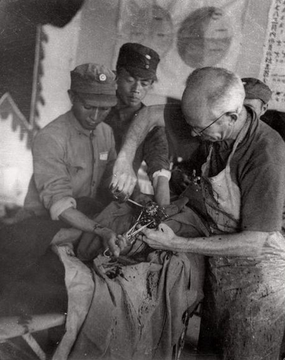December 13th, 2019
BURLINGTON, ON
Readers will know that it is not often I agree with Andrew Scheer. But I was encouraged by the part of his rebuttal to the throne speech, where he raised resolution of the year-long China problem. And again, I applauded Scheer’s follow-up motion to strike a committee to that end, a motion supported by all the opposition parties, though not the Liberals.
It’s possible the government knows what it is doing on this file and has it under control. But that’s not good enough. Canadians are in the dark and want some answers. The Chinese leadership’s anger over the detention of the nation’s Huawei executive is unmeasured and precipitous. Seizing innocent Canadians and torturing them to make a point and then declaring a trade war are pretty hostile acts for a nation which used to consider Canada one of its best friends in the west.

Dr. Norman Bethune saved the lives of millions of Chinese soldiers and civilians during the second Sino-Japanese war. He is credited with bringing modern medicine to rural China.
Canadians were once held in high regard. Our own Dr. Norman Bethune saved the lives of millions of Chinese soldiers and civilians during the second Sino-Japanese war. He is credited with bringing modern medicine to rural China, having treated sick villagers as well as wounded soldiers. His selfless commitment made such an impression that Mao Zedong wrote a eulogy to him on his death – one that had been celebrated by generations of Chinese people.
That may be too long ago for today’s Chinese leaders, but even they might have heard that it was Justin’s father, Pierre, who made Canada the first western country, since before the Korean War, to it grant it recognition as the rightful government of China. Canada also played the lead role in bringing China into the World Trade Organization, something which stinks of irony now that we are having to sue them over their illegal blockade of our oil seed and meat exports.
China is our second biggest trading partner. But the trade is horribly lopsided. We import much more than they buy from us. In 2016 we imported over $40 billion more than we exported to China. Much of that trade is in the kind of disposal-ready stuff one sees at the Dollar Store or Walmart, aka China Inc. Chinese-made goods have virtually helped decimate our textile, book making and other manufacturing industries.
And Canadians are starting to get fed up. For example, a recent Pew Research survey showed that two-thirds of Canadians now view China negatively. But we don’t see that reflected in the limited actions our federal government has taken so far, actions which have failed to bring about the kind of behavioural changes we should expect.
So people are speaking up. The Senate recently suggested using the Magnitsky law to sanction Chinese officials. Somebody else has mused that we should ban commercial air freighters from over flying Canada. Of course banning Huawei from investing in Canadian telecom infrastructure, as most of our five eyes partners have done, is a no brainer.

Emerald ash borer: The insect arrived from China in some kind of wood product and is now eradicating ash trees across this province.
Even though China is in the WTO, the nation is anything but a fair trader, it has a long history of ‘dumping’ goods on foreign markets, stealing intellectual property and manipulating its currency. We could retaliate in kind. For example banning all Chinese forest products as a precaution against something like the emerald ash borer ever happening again. The insect arrived from China in some kind of wood product and is now eradicating ash trees across this province.
The Trudeau government has promised legislation to ban single use plastics. We could virtually ban imports from all nations, including China, which are packaged in plastic – or at least insist that all exporting nations take its waste back for recycling… and not just dump it in the ocean.
And then there is the question of foreign investment. Mr. Trudeau, like his processor Mr. Harper has appeared indecisive and inconsistent, seemingly making up policy on the fly, when trying to decide just how much of our door we can safely open to the second largest economy on earth.
Today’s China is a rapidly militarizing autocratic state with a president-for-life. And given the upshot from this Huawei extradition morass it is clear that China understands neither the rule of law nor how to conduct non-combative diplomacy. One just needs to consider Tibet, Tiananmen Square, Falun Gong, Uighurs and now Hong Kong where 300,000 people with Canadian citizenship live.
This is a complicated and even dangerous file, and lives are at stake. In addition, China has been touted as one of the potential markets for all that extra oil and gas which Alberta and B.C. keep saying they can export. But how likely is that if Canada responds in-kind and the spat escalates?
Andrew Scheer did the PM a favour by striking this committee, something which Trudeau may learn to appreciate, despite his knee jerk rejection. Perhaps he is concerned about control. Though chaired by the PM’s party, Liberals are not in majority. And the PM and ministers can be called to testify as witnesses. And why not? Call it full disclosure. Call it burden sharing. Call it how minority government should work – that is, cooperatively.
It is been a rare moment when this columnist actually agreed with the leader of the Conservative party. And then Mr. Scheer has the gumption to up and resign, apparently because he was under attack for using party funds to send his kids to private school. Maybe I shouldn’t have been so quick to give Scheer my blessing.
 Ray Rivers writes regularly on both federal and provincial politics, applying his more than 25 years as a federal bureaucrat to his thinking. Rivers was once a candidate for provincial office in Burlington. He was the founder of the Burlington citizen committee on sustainability at a time when climate warming was a hotly debated subject. Ray has a post graduate degree in economics that he earned at the University of Ottawa. Tweet @rayzrivers
Ray Rivers writes regularly on both federal and provincial politics, applying his more than 25 years as a federal bureaucrat to his thinking. Rivers was once a candidate for provincial office in Burlington. He was the founder of the Burlington citizen committee on sustainability at a time when climate warming was a hotly debated subject. Ray has a post graduate degree in economics that he earned at the University of Ottawa. Tweet @rayzrivers
Background links:
Trudeau Legacy China – China History –























Minister Karina Gould’s Response to the, Proposed special committee on Canada-China relations
“Mr. Speaker, I am pleased to rise in the House today to address the motion
brought forward by the member for Durham. I would like to begin by first
acknowledging that today marks one year since Michael Kovrig and Michael
Spavor were arbitrarily detained in China. It must be stated that they are
and will remain our absolute priority as a government and as Canadians.
Canada’s relationship with China is deep and long-standing. In these
difficult times, we must work together to resolve these differences, keeping
in mind that the safety and security of Canadians remains our top priority.
With perseverance, care and determination, we are working to bring them back
to Canada.
Despite the breadth of these bilateral ties, as with any diplomatic
relationship ours is not without its challenges, and we are going through a
particularly difficult period. Canadians, as we have heard on all sides of
the House, are deeply concerned by the arbitrary detentions of Michael
Kovrig and Michael Spavor and the arbitrary sentencing to death of Robert
Schellenberg.
Canadians are also concerned by the human rights situation faced by Muslim
Uighurs and other minorities in China. The recent developments in Hong Kong
are of particular concern to Canadians, given the 300,000 Canadians living
there. The Government of Canada continues to share these concerns and has
spoken out consistently.
Our government will always raise issues that matter to Canadians with the
Chinese government, including respect for democracy, human rights and the
rule of law. Canada remains staunchly committed to defending its principles
and interests. As the Prime Minister and the Minister of Foreign Affairs
have clearly stated, all levels of government are involved in the cases of
the Canadians who have been arbitrarily detained and convicted in China.
We salute Mr. Kovrig, Mr. Spavor and their families for their courage and
moral fortitude under exceptionally trying circumstances. Today, December
10, marks exactly one year since Michael Kovrig and Michael Spavor were
arbitrarily arrested by Chinese authorities. Neither man has had access to a
lawyer or any contact with their families or loved ones since they were
first detained.
The government has made it very clear that the detention of these two
Canadians is unacceptable, that they are being arbitrarily imprisoned and
that they must be released without delay. We have raised this issue with
every level of the Chinese government, and we will continue to do so every
chance we get until these men are freed.
Ambassador Barton, the diplomatic team in China and our government will
continue to support these men and their families by providing consular
services.
This matter is not just a concern for Canada. but a concern to all who seek
to defend the rules-based international order. Arbitrary detention and
sentencing Canadians absolutely betrays the principles of the rule of law.
Several countries, despite what my colleague across the way has said, have
spoken out to echo concerns about China’s actions, including Australia, the
Czech Republic, France, Germany, the United Kingdom, the United States, the
Netherlands, Latvia, Lithuania, Estonia and Spain, along with the European
Union and NATO.
Leaders in academia, in the private sector and across civil society have
also joined the chorus. An open letter signed by diplomats and scholars from
19 countries is just one example of how the concern over China’s actions
extends well beyond Canada’s own borders.
We will continue, along with Canada’s ambassadors around the world, to speak
to foreign counterparts and other stakeholders about the issue, emphasizing
the troubling precedent represented by these arbitrary measures.
Indeed, Canada is not alone as citizens of many countries have been
targeted.
It is important that China recognize that its actions are harming its
reputation in the eyes of many other countries, not only Canada, and sending
the wrong message to the international community.
We understand that the arrest in Canada of Ms. Meng Wanzhou is a matter of
utmost concern for China. Ms. Meng was arrested in accordance with Canada’s
international legal obligations under the Canada-U.S. extradition treaty.
This was not about our relationship with China nor about our relationship
with the United States. This was about Canada’s unwavering commitment to
uphold the rule of law and fulfill our legal obligations.
Canada has over 50 bilateral extradition agreements and we uphold them all
with equal vigour. As China also has dozens of active bilateral extradition
agreements, this is a process that should be well understood.
For Canada, the rule of law is not optional. It is the bedrock of our
Canadian democracy and a core Canadian value. Canada will not compromise nor
politicize the rule of law and due process.
Canada is conducting a fair, unbiased and transparent legal proceeding with
respect to Ms. Meng. Canada granted consular access to China within hours of
Ms. Meng’s arrest and Ms. Meng was granted bail. Ms. Meng is represented by
an experienced counsel and will be given every opportunity to raise any
issue that she or her counsel believe to be relevant throughout the legal
proceedings.
This is timely, as today, December 10, is also Human Rights Day around the
world.
Canada has consistently called on China to respect, protect and promote the
freedom of opinion and expression, freedom of peaceful assembly and
association and freedom of religion or a belief of all Chinese citizens.
We continue to raise human rights and the rule of law issues with our
Chinese counterparts at all levels.
The promotion and protection of human rights is fundamental to Canada’s
foreign policy and remains an unwavering priority for the Government of
Canada. Although China’s economic growth has resulted in a general
improvement in the standard of living of the country’s population, there has
been a worrisome deterioration in respect for civil and political rights in
China. Freedom of religion or belief is also threatened.
Canada is deeply concerned about the ongoing intimidation and repression of
ethnic and religious minorities and other vulnerable groups in China,
including Tibetan Buddhists, Uighurs and other Muslims, Christians, Falun
Gong practitioners, women and girls, and members of the LGBTQ community.
Canada has expressed concerns about the shrinking space for civil society in
China. The intensification of actions against human rights defenders, such
as lawyers, journalists and civil society actors, is also worrisome.
Our government has consistently raised concerns with our Chinese
counterparts about human rights in China, including the situation in
Xinjiang. We have spoken publicly at the UN Human Rights Council, urging
Chinese authorities to release all Uighurs arbitrarily detained in Xinjiang.
This includes statements in September 2018, November 2018 and March 2019. In
July 2019, Canada stood alongside 21 countries, including Australia,
Denmark, Finland, France, Germany, the Netherlands, Norway, Sweden, Japan
and the United Kingdom, and presented a letter to the Human Rights Council
expressing these concerns.
More recently, on October 29, the United Kingdom, on behalf of 23 countries,
including Canada, expressed their concern regarding the arbitrary detention
of Uighurs and human rights in Xinjiang, China, at the third committee of
the UNGA with the committee on the elimination of racial discrimination. We
will continue to raise these and other human rights concerns at every
possible opportunity and to call on the Chinese government to ensure that
the human rights of its citizens are fully respected.
Canada continues to monitor closely the current unrest in Hong Kong. Canada
urges all sides involved in the current crisis to exercise restraint, to
refrain from violence and to engage in peaceful and inclusive dialogue.
With 300,000 Canadians living in Hong Kong, Canada has a vested interest in
Hong Kong’s stability and prosperity. We continue to support the right of
peaceful protest and Hong Kong’s high degree of autonomy under the basic law
and the one country, two systems framework.
Canada commends the people of Hong Kong for the peaceful election of its
district council on November 24. This was an important opportunity for the
people of Hong Kong to express their point of view. We hope that the
election will help pave the way for dialogue and peaceful reconciliation.
Despite the challenges we face, it is important to recognize that Canada’s
bilateral relationship with China has always included many different areas
of valuable co-operation. In recent years, we have enhanced our framework of
formal engagement mechanisms. While we regret that the Government of China
has chosen to restrict collaboration, Canada continues to pursue dialogue at
every level.
With the recent exchange of ambassadors in Ottawa and Beijing, we remain
hopeful that formal and informal dialogues will continue. My colleague, the
Minister of Foreign Affairs, raised his expectations for continued dialogue
when he met with China’s foreign minister on the margins of the G20 meetings
in Nagoya at the end of November.
The Government of Canada is deeply concerned by the decision of the Chinese
authorities to restrict imports of Canadian canola, and we are pressing for
the complete resumption of trade in bilateral discussions in the WTO.
Our pan-Canadian efforts have led to the resumption of trade in pork and
beef, and we will continue to press for Canadian interests at every
opportunity.
There are many clear sectors of valuable, practical engagement. Climate
change and the environment require global solutions, and China will be an
essential partner in this pursuit. Canada has built productive collaboration
with China in this area and will continue to do so.
Health is an example of the importance of ongoing collaboration and dialogue
to advance practical co-operation. Global pandemics pose significant risks.
Canada and China have long-standing bilateral co-operation on health issues,
including on international health.
Culture is another important area of bilateral co-operation between Canada
and China. We are witnessing a growing number of independently organized
exchanges by arts organizations. These exchanges help enrich both of our
cultures and contribute to shared knowledge and understanding. Canada must
build a stronger understanding of China.
These and other areas of bilateral engagement are a valuable reminder of the
importance of ongoing dialogue with Chinese counterparts.
I would like to emphasize that Canada will continue to navigate this
challenging period with China through careful and strategic engagement.
Engaging with China is important to realizing and promoting Canada’s
interests globally. This is why it is essential that the channels of
communication remain open, while ensuring that Canada communicates clearly
to China our firm commitment to securing the release of Michael Kovrig and
Michael Spavor and to uphold Canadian values and principles.
Ultimately, China must realize that asserting pressure on another country
through arbitrary measures against foreign citizens sends the wrong message
to the international community. It is not an effective way to resolve
bilateral challenges.
We will pursue and all-of-Canada approach and continue to endorse a united
front. This is not a partisan issue nor does it help Mr. Kovrig and Mr.
Spavor to play politics with this issue.
Canada will continue to stand on its principles and the rules-based
international order that has sustained global and peace and prosperity for
decades. In our principled engagement with China, we will pursue
collaboration where we can and defend our values and interests where we
must.”
Full debate may be found at: https://openparliament.ca/debates/2019/12/10/karina-gould-1/
And I agree with you Ray. Good article. High time HNIC stopped using Huawei ads.